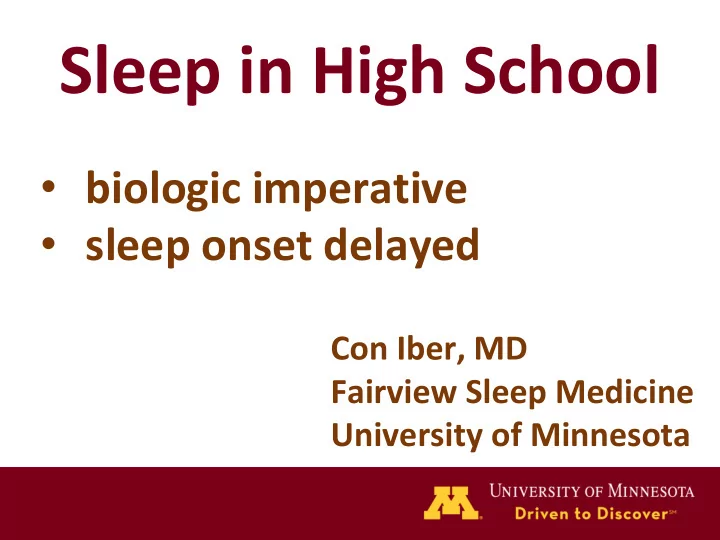

Sleep in High School • biologic imperative • sleep onset delayed Con Iber, MD Fairview Sleep Medicine University of Minnesota
Sleep…… is a biological imperative that affects mortality, health and safety • clock timing altered by light • can be local and generalized • enhances brain function • balances mood
Sleep Clock Start Time Sleep Homeostatic drive (Sleep Load) Wake Sleep Alertness level Circadian alerting signal 9 AM 3 PM 3 AM 9 PM 9 AM Time
Sleep rhythm is delayed after age 12 DOI: 10.1111/j.1365-2869.2007.00584.x
Sleep debt n=7374 adapted from National Conference | October 3-4, 2013 doi: 10.1001/jamapediatrics.2013.423
Crashing into school
What happens if you don’t get sleep?
Cajochen No sleep=performance problem http://www.ncbi.nlm.nih.go v/pubmed/8746397 National Conference | October 3-4, 2013
sleep and safety ………why is he driving? • Car accidents: highest cause of death in teens • 2,700 teens killed Performance error (2010) Increased risk in accidents: 4-5 x night shift work [7% of population] Highest 12-3 am weekends Majority of fatal are single driver https://youtu.be/QZZNxJS3mAI
how are we doing? CDC BRFSS n=74,571 in 12 states • 35.3% < 7 hours sleep • 37.9% fell asleep unintentionally/1 month Performance error • 4.7% fell asleep driving/1 month Increased risk in accidents: 4-5 x night shift work [7% of population] Highest 12-3 am weekends Majority of fatal are single driver http://www.cdc.gov/features/dssleep/
How much sleep is necessary? Evidence reviews 2015: • AASM > 7hours in adults and > 9 hours in teens • ATS 7-9 hours in adults
Ok, but WHY? ……… what’s the science ?
Why do humans need sleep? • Clearance of neurotoxins • Synaptic homeostasis and plasticity • Learning, memory and abstraction
Perivascular clearance doi: 10.1227/01.neu.0000442978.07078.e5 National Conference | October 3-4, 2013
Pruning and synaptic enhancement National Conference | October 3-4, 2013
Sleep and Brain Enhancement • Unitization the ability to transform packets of memory into a unitary entities – from 539 75 214 to 53975214 • Assimilation placing new spoken words in a family of similar phonemically related words • Abstraction the ability to recognize embedded rules in nonsense information PMCID: PMC2891532
REM sleep deprivation: impact on emotional reactivity • Increased amygdala activity • Decreased amygdala connectivity • Increased emotional reactivity
sleep and mood N= 27,939 adolescents doi: 10.1007/s10964-014-0170-3 60.0% 51.8% 40.7% 45.0% 32.0% 31.2% 27.5% 30.0% 25.0% 21.3% 20.4% 19.0% 13.6% 15.2% 15.3% 12.1% 15.0% 9.6% 8.0% 6.6% 5.3% 3.1% 2.4% 2.4% 1.7% 0.0% 4 Hours 5 Hours 6 Hours 7 Hours 8 Hours 9 Hours 10 Hours or Less or More Feeling Sad & Hopeless Considered Suicide Attempted Suicide
sleep in high school • biologic imperative • sleep onset delayed habits and schedules drive health, safety, and performance
Translating sleep biology for high school students • You will do better on tests • You will look better • Your mood will be better • You will be less likely to have a car accident • You will be less likely to gain weight • You will live longer
Recommend
More recommend